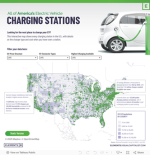Big picture for 2025
- Federal credits changed in late 2025. The “new clean vehicle credit” (IRC §30D) and the “used clean vehicle credit” (§25E) that ran through most of 2025 were sunset for vehicles placed in service after Sept 30, 2025, with limited transition rules. If you bought earlier in 2025, normal eligibility rules applied; after Sept 30, new purchases aren’t eligible (leasing is different—see below). Times Union+1
- Dealer point-of-sale transfers (2024–2025). For most of 2025, buyers could transfer the federal credit to a registered dealer to knock the amount off the price immediately at checkout. Dealers had to be registered in the IRS Energy Credits Online system to do this. The Department of Energy's Energy.gov+1
- Leases: For leases, the lessor (leasing company) claims any federal clean-vehicle/commercial credit and may pass some/all of the value through in the lease terms. This differs from retail purchases. irs.gov
- States still matter a lot. Even with federal shifts, many states (and some cities/air districts) continue to offer rebates, state tax credits, sales-tax exemptions, and charger incentives in 2025. The U.S. DOE Alternative Fuels Data Center (AFDC) maintains the definitive, continuously updated catalog—use it to verify what’s live the week you buy. afdc.energy.gov+1

Tip: Policies, funding windows, and income/MSRP caps change frequently. Always check your state’s official page right before you sign.
Notable 2025 highlights (examples)
- California (targeted, income-based): While the historic statewide CVRP has sunset, Clean Cars 4 All offers substantial grants (often up to five figures) to income-qualified households that scrap an older vehicle and replace it with a cleaner one; regional programs (e.g., Bay Area) also support swaps and even e-mobility options. ww2.arb.ca.gov+1
- Colorado (broad state tax credit): Colorado provides a state income-tax credit for new EVs, with higher amounts for lower-MSRP models (additional bump under certain price thresholds). Check the AFDC program text for current amounts and phase-downs. afdc.energy.gov
- New Jersey (point-of-sale): Charge Up New Jersey delivers an instant-at-the-dealer rebate for eligible BEVs, plus Charge Up+ for income-qualified applicants and a $250 home charger rebate. Charge Up New Jersey+1
- New York: Drive Clean Rebate (statewide) provides up to $2,000 depending on EPA range and MSRP, separate from utility and charging-program incentives like Charge Ready NY. NYSERDA+1
- Oregon: The Clean Vehicle Rebate program reopened in May 2025 but suspended the Standard Rebate again in September due to funding limits; the Charge Ahead (income-qualified) component has its own rules and windows. Always verify current status. opb+2oregon.gov+2
How point-of-sale works (when available)
At checkout, a registered dealer can apply the federal clean-vehicle amount (when applicable) as cash off the price and later reconcile it with the IRS. You still must meet eligibility requirements, and the dealer must be registered for time-of-sale reporting. States like New Jersey also run state rebates at the point of sale. The Department of Energy's Energy.gov+2irs.gov+2
State-by-state table (quick links to the official rules)
The fastest way to confirm your current 2025 eligibility is to open your state’s AFDC page below. Many entries also include a flagship program name to look for on the state/agency site.
Stacking state + utility + local incentives {#stacking}
Many households combine: (1) state purchase/lease incentive, (2) utility charger rebate or off-peak bill credit, (3) municipal/air district scrappage or low-income incentive, and (4) home-charger rebate. Examples:
- NJ: State Charge Up at point of sale + $250 home charger rebate. Charge Up New Jersey+1
- NY: Drive Clean up to $2,000 + utility programs (e.g., Charge Ready NY for L2 chargers at workplaces/MUDs). NYSERDA+1
- MA: MOR-EV ($3,500+ depending on program variant) with bonus for income-qualified applicants in some cases. Massachusetts Clean Energy Center
- OR: Windows open/close—Standard suspended in Sept 2025; Charge Ahead income-qualified has its own lane. oregon.gov
Checklist before you buy or lease
- Confirm the current rule on your exact purchase/lease date via AFDC + the state program’s homepage. Funding can pause mid-year. afdc.energy.gov
- Mind the caps: income caps, MSRP caps, battery/mineral sourcing (for federal, when applicable), residency, and “placed in service” timing. irs.gov
- For federal point-of-sale (when available): confirm your dealer is IRS-registered for time-of-sale/advance payment; ask to see the confirmation. irs.gov
- Leasing? Understand that the lessor claims any federal credit; negotiate pass-through in your lease payment. irs.gov
- Keep paperwork: purchase/lease agreement, proof of residency/income (if required), charger receipts, and application IDs.
Example spotlight: a few programs in detail
- New Jersey – Charge Up New Jersey (2025): Instant rebate at participating dealers; base Charge Up plus Charge Up+ for income-qualified residents; separate $250 residential charger rebate. Check the official portal for current amounts and eligible models. Charge Up New Jersey+1
- New York – Drive Clean Rebate: Up to $2,000 depending on electric range and MSRP; extensive eligible-models list published by NYSERDA. NYSERDA+1
- Massachusetts – MOR-EV: State rebates for new and used EVs (and certain trucks); program language notes alignment with federal timing that ended Sept 30, 2025—program itself continues subject to state funding. Mass.gov+1
- Oregon – Clean Vehicle Rebate / Charge Ahead: Reopened in May 2025 then suspended Standard in Sept 2025 due to exhausted funds; Charge Ahead (income-qualified) has separate criteria—watch the DEQ site for windows. opb+2oregon.gov+2
- Colorado – State EV tax credit: A line-item on your Colorado income tax return, with an extra bump for lower-MSRP models; verify amounts and phase-downs on AFDC/state pages. afdc.energy.gov
FAQs
Do any states still offer sales-tax exemptions instead of rebates?
Yes—some do, notably Washington has historically offered sales-tax relief subject to price caps. Always confirm the current rule on AFDC right before purchase. afdc.energy.gov
What about home-charger incentives?
Even in states without a vehicle rebate, utilities often offer $200–$1,000 home-charger rebates or time-of-use bill credits. Check your AFDC state page and your local utility’s EV page. afdc.energy.gov
